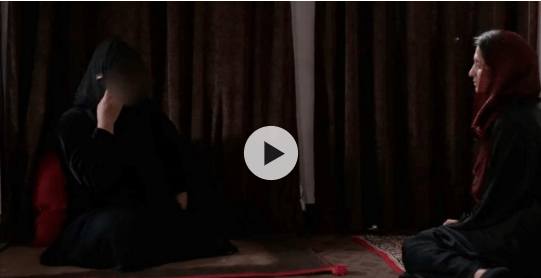
The daily English lessons that Shabana attends are the highlight of her day. Taking the bus in Kabul to the private course with her friends, chatting and laughing with them, learning something new for one hour each day – it’s a brief respite from the emptiness that has engulfed her life since the Taliban took over Afghanistan.
In another country, Shabana* would have been graduating from high school next year, pursuing her dream to get a business degree. In Afghanistan, she and all teenage girls have been barred from formal education for three years.
Now even the small joys that were making life bearable are fraught with fear after a new law was announced saying if a woman is outside her home, even her voice must not be heard.
“When we got out, we’re scared. When we’re on the bus, we’re scared. We don’t dare to take down our masks. We even avoid speaking among ourselves, thinking that if someone from the Taliban hears us they could stop and question us,” she says.
The BBC has been in Afghanistan, allowing rare access to the country’s women and girls – as well as Taliban spokespeople – reacting to the new law, which was imposed by the Taliban’s supreme leader Haibatullah Akhundzada.
The law gives the Propagation of Virtue and Prevention of Vice Ministry – the Taliban’s morality police – sweeping powers to enforce a stringent code of conduct for Afghan citizens.
For women who have already had their freedoms crushed bit by bit by a relentless series of decrees, it delivers another blow.
“If we can’t speak, why even live? We’re like dead bodies moving around,” Shabana says.
“When I learnt about the new law, I decided not to attend the course any more. Because if I go out, I’ll end up speaking and then something bad might happen. Maybe I won’t return home safely. But then my mother encouraged me to continue.”
In the three years since the Taliban takeover, it’s become clear that even if edicts aren’t strictly imposed, people start self-regulating out of fear. Women continue to be visible in small numbers on the streets of cities like Kabul, but nearly all of them now are covered from head to toe in loose black clothes or dark blue burqas, and most of them cover their faces with only their eyes visible, the impact of a decree announced last year.
“Every moment you feel like you’re in a prison. Even breathing has become difficult here,” said Nausheen, an activist.
Until last year, whenever new restrictions were announced, she was among small groups of women who marched on the streets of Kabul and other cities, demanding their rights.
The protests were violently cracked down on by the Taliban’s forces on multiple occasions, until they stopped altogether.
Nausheen was detained last year. “The Taliban dragged me into a vehicle saying ‘Why are you acting against us? This is an Islamic system.’ They took me to a dark, frightening place and held me there, using terrible language against me. They also beat me,” she says, breaking down into tears.
“When we were released from detention we were not the same people as before and that’s why we stopped protesting,” she adds. “I don’t want to be humiliated any more because I’m a woman. It is better to die than to live like this.”
Now Afghan women are showing their dissent by posting videos of themselves online, their faces covered, singing songs about freedom. “Let’s become one voice, let’s walk together holding hands and become free of this cruelty” are the lines of one such song.







